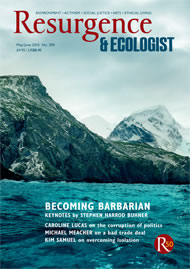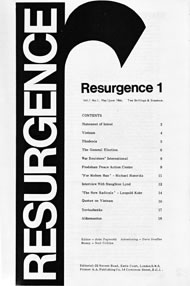The first issue of Resurgence appeared in May 1966. It numbered just 20 pages, its closely set type relieved only by a handful of poor quality black-and-white photographs. But something of its ambition was indicated by the cover – the word ‘RESURGENCE’ in bold white capitals running up within a giant letter ‘r’ towering over a list of contents, together with other brief details: the confident “Vol.1 No. 1”; the pre-decimal price (two shillings and sixpence); the briefest of staff listings (‘Editor – John Papworth, Advertising – Dave Swaffer, Money – Neil Collins’), and the magazine’s first address, in a modest street in Earls Court, central west London.
Inside, the contents hint not just at the magazine’s immediate preoccupations, but also at something of its future direction. “Why another peace publication?” John Papworth asked rhetorically in an opening ‘Statement of Intent’, before criticising the “monolithic thinking which has led us to the everyday acceptance of huge monolithic nation states which are preparing to blow us to dust in defiance of all reason or desire. It ignores, as increasingly do our war states, the infinite variability of the human personality and its needs, and it ignores too, that if we allow the fulfilment of those needs to be thrust aside merely to satisfy the needs of administrative convenience, or of machines or market forces, there ensues not merely an impoverishment of the human situation, but also a socio-political trend which helps to lead us to war.”
Reinforcing this, Papworth wrote: “Man must achieve a steadier tempo of social progress, together with a more organic and more dispersed structure of power… mankind is moving into a state of endemic emergency in relation to the problem of war, human numbers, food and energy supplies, and human identity.”
Leopold Kohr’s article ‘The New Radicalism’, which we have reprinted in our May/June 2015 issue, marked Resurgence’s resolve to explore the ideas that have since flowered: the ideas and virtues of small-scale communities, personal liberty and “the great freedoms that have helped man to realise his humanity: the freedom of mind, the freedom of conscience, the freedom to have his own identity, to be himself”. Kohr’s introduction, referring to the “affluent society” widely thought in 1966 to have been established in Britain, may today be criticised. But his call for a new radicalism remains relevant almost half a century on.
Greg Neale is editor at Resurgence & Ecologist.








